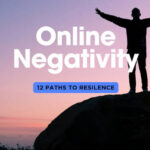In today’s digital world, your online presence is often the first impression people have of you or your business. Whether you’re a professional looking to enhance your reputation or a brand trying to attract customers, cultivating a positive online presence is essential. A strong digital footprint can open doors to new opportunities, build trust, and establish you as a credible authority in your field. In this guide, we’ll explore effective strategies to help you build and maintain a positive presence online.
1. Be Consistent Across Platforms 📱
Maintaining a consistent image and message across your social media accounts, website, and any other online platforms is crucial. Consistency helps reinforce your personal or business brand and ensures that people recognize and trust you, no matter where they find you.
- Why It’s Important: A consistent presence makes you appear more professional and reliable, building credibility with your audience.
- Action Tip: Use the same profile picture, bio, and key messaging across all platforms. Align your tone and style so that your audience gets a unified experience, whether they’re reading a tweet or visiting your LinkedIn profile.
2. Engage with Your Audience Positively 💬
Being active and engaging with your followers or audience in a positive, constructive way is one of the easiest ways to build goodwill online. Respond to comments, answer questions, and participate in discussions that align with your personal or brand values.
- Why It’s Important: Regular engagement humanizes you or your brand and fosters a sense of community, leading to higher trust and loyalty.
- Action Tip: Set aside time each day or week to interact with your followers. Respond to comments or messages thoughtfully, and don’t shy away from offering help or sharing useful insights. Always maintain a positive tone, even when dealing with criticism.
3. Create Valuable Content 📝
Publishing content that offers real value to your audience is one of the most effective ways to build a positive online presence. Whether you’re sharing tips, industry insights, or personal experiences, make sure your content is informative, relevant, and helpful.
- Why It’s Important: High-quality content establishes you as a thought leader in your niche and shows that you care about providing value rather than just promoting yourself.
- Action Tip: Post blog articles, social media updates, or videos that address common questions or problems your audience faces. Tailor your content to their needs, and focus on being informative rather than promotional.
4. Be Authentic and Transparent 🌟
Authenticity is key to building a lasting, positive presence online. People are more likely to trust and engage with you when you are open and honest about who you are and what you stand for. Avoid projecting a false image or exaggerating your successes, as this can backfire.
- Why It’s Important: Transparency and authenticity build genuine connections with your audience, fostering trust and long-term loyalty.
- Action Tip: Share personal stories, challenges, and even failures alongside your successes. Show your audience that you are human, which makes you more relatable and trustworthy. Avoid overly curated or “too perfect” portrayals that can seem inauthentic.
5. Collaborate with Others in Your Industry 🤝
Building connections and collaborating with others in your industry can greatly enhance your online presence. Partnering with like-minded individuals or brands for joint projects, interviews, or content sharing allows you to tap into new audiences and adds credibility to your profile.
- Why It’s Important: Collaborating with respected professionals or businesses expands your reach and positions you as a trusted and connected player in your field.
- Action Tip: Reach out to influencers, industry leaders, or complementary brands to co-create content, cross-promote, or participate in each other’s events or webinars. Networking helps strengthen your online community.
6. Regularly Update and Maintain Your Profiles 🛠️
An outdated or neglected online profile can send the wrong message to your audience. Make sure all your digital platforms, from your website to your social media profiles, are regularly updated with current information, new content, and fresh visuals.
- Why It’s Important: Keeping your online presence up to date signals that you’re active and engaged in your field. It also helps visitors access the latest and most relevant information about you or your business.
- Action Tip: Set aside time each month to audit your profiles. Update your bio, profile picture, and any outdated information. Make sure all links are working and your content reflects your current goals or offerings.
7. Be Responsive and Helpful 📨
Responding to inquiries, feedback, or questions in a timely and helpful manner shows that you value your audience and care about their experience. Whether through direct messages, comments, or emails, being responsive fosters trust and loyalty.
- Why It’s Important: Engaging in meaningful, timely conversations strengthens your relationships and boosts your reputation as someone who is approachable and dependable.
- Action Tip: Set up notifications for your social media and email to ensure you don’t miss messages. Try to respond within 24-48 hours, and always aim to be helpful, even when dealing with negative feedback.
8. Monitor Your Online Reputation 🔍
It’s important to keep track of what people are saying about you or your brand online. By regularly monitoring mentions, reviews, and comments, you can quickly address any negative feedback or misinformation and protect your reputation.
- Why It’s Important: Actively managing your online reputation ensures that you can resolve issues before they escalate and maintain a positive image in the public eye.
- Action Tip: Use tools like Google Alerts, social media monitoring platforms, or reputation management services to track mentions of your name or business. Promptly address any negative reviews or comments with professionalism and a solution-oriented approach.
9. Share Positive Testimonials and Reviews 🌟
Showcasing positive feedback from clients, customers, or colleagues is a powerful way to build trust and credibility. When potential clients or followers see real, authentic testimonials, it reinforces the idea that you are reliable and produce results.
- Why It’s Important: Positive testimonials act as social proof, helping to validate your expertise or the quality of your business to potential customers or partners.
- Action Tip: Feature testimonials or reviews on your website, social media profiles, or marketing materials. Encourage happy customers to leave feedback, and don’t be shy about sharing their success stories.
10. Avoid Engaging in Online Negativity 🚫
Staying positive also means avoiding public arguments, conflicts, or unnecessary drama online. Engaging in negative discussions or public disputes can tarnish your image and alienate followers. Instead, focus on constructive and respectful communication, even when facing criticism.
- Why It’s Important: A positive, professional tone shows maturity and emotional intelligence, which can enhance your reputation and prevent unnecessary controversy.
- Action Tip: If you encounter negativity, handle it calmly. You can either respond diplomatically or choose not to engage. If a situation escalates, consider using moderation tools to filter or block harmful content.
11. Support Others and Share Their Success 🙌
An effective way to build a positive presence online is by lifting others up. Celebrate the achievements of your peers, clients, or industry professionals by sharing their work or success stories. Offering support not only strengthens your network but also shows that you are a team player.
- Why It’s Important: Supporting others and sharing their success builds goodwill and can lead to reciprocal support, expanding your visibility in a positive way.
- Action Tip: Regularly share posts, achievements, or helpful content from others in your network. Offer congratulations, provide thoughtful comments, and promote collaboration.
12. Stay True to Your Values 💡
Finally, one of the most important ways to build a positive presence online is by staying true to your core values. Be clear about what you stand for and ensure that all your actions, posts, and communications reflect these values. Authenticity and integrity are key to creating a positive, lasting presence.
- Why It’s Important: When your online actions align with your values, it builds trust and respect among your audience. People are more likely to follow and engage with someone who is transparent and consistent in their beliefs.
- Action Tip: Regularly revisit your values and mission to make sure your content and interactions are aligned. Don’t compromise your values for temporary gains, and always act with integrity.
13. Showcase Your Expertise with Case Studies 📚
One of the most effective ways to establish credibility is by sharing real-world examples of your work or success stories in the form of case studies. Demonstrating how you’ve helped clients or solved specific problems showcases your skills and expertise in action.
- Why It’s Important: Case studies provide concrete proof of your capabilities and highlight the value you bring to your audience or customers.
- Action Tip: Create detailed case studies that walk through the problem, your approach, and the outcome. Publish these on your website and share them on social media to build trust and attract new opportunities.
14. Host Webinars or Live Q&A Sessions 🎥
Engaging with your audience through live sessions, such as webinars or Q&A events, allows you to interact directly with followers and provide valuable insights. It’s a great way to demonstrate your knowledge while fostering real-time engagement.
- Why It’s Important: Live interaction builds a sense of community and trust. It shows that you are approachable and willing to share your expertise freely.
- Action Tip: Choose topics that align with your audience’s interests or pain points. Promote the event ahead of time and encourage participation through questions and feedback.
15. Develop a Content Calendar 🗓️
Consistency is key when building a positive presence online, and a content calendar can help ensure that you’re regularly posting and sharing valuable content. Planning ahead allows you to maintain a steady flow of engagement with your audience without last-minute stress.
- Why It’s Important: A content calendar helps you stay organized and consistent, which is crucial for keeping your audience engaged and interested in your content.
- Action Tip: Plan your content at least a month in advance, including blog posts, social media updates, and special promotions. Use tools like Google Calendar, Trello, or content management software to keep track of your schedule.
16. Diversify Your Content Formats 🎨
Experimenting with different content formats—such as videos, infographics, podcasts, and blog posts—can help you reach different segments of your audience and keep your content fresh. Different formats appeal to different learning styles, so diversifying helps broaden your reach.
- Why It’s Important: Offering varied content keeps your audience engaged and ensures that you’re catering to different preferences, boosting your overall visibility and appeal.
- Action Tip: Repurpose your existing content into different formats. For example, turn a blog post into an infographic or a podcast episode into a video snippet to share on social media.
17. Participate in Online Communities 🌐
Becoming an active member of online communities, forums, or groups related to your industry or interests is a great way to increase your visibility and credibility. By contributing thoughtful responses, answering questions, and offering support, you’ll position yourself as a helpful and knowledgeable resource.
- Why It’s Important: Active participation in online communities helps you build relationships with like-minded individuals, expand your network, and create opportunities for collaboration.
- Action Tip: Join relevant LinkedIn groups, Reddit threads, or industry-specific forums and engage regularly by answering questions or sharing insights.
18. Offer Free Resources or Tools 🎁
Providing your audience with free resources, such as downloadable guides, templates, or tools, adds immense value and helps you build trust. This demonstrates your willingness to share your expertise without asking for anything in return, which can significantly boost your positive reputation.
- Why It’s Important: Offering free resources shows that you are invested in helping your audience succeed, which builds goodwill and long-term loyalty.
- Action Tip: Create simple, useful resources based on your expertise—such as an eBook, checklist, or template—and make them available for free download on your website or through social media.
19. Stay Informed and Share Industry Trends 📊
Keep up with the latest trends and developments in your industry and share relevant insights with your audience. Being on top of industry news positions you as an informed thought leader and allows you to provide timely value to your followers.
- Why It’s Important: Staying informed shows that you’re proactive and knowledgeable about changes and advancements in your field, making you a trusted source of information.
- Action Tip: Subscribe to industry newsletters, follow thought leaders, and attend relevant events or webinars. Share key insights or trends on your social media platforms, blog, or email newsletter.
20. Measure Your Progress and Adjust 📈
Building a positive online presence is an ongoing process, and it’s important to regularly measure your progress and adjust your strategies accordingly. Use analytics tools to track your social media engagement, website traffic, and content performance to understand what’s working and where improvements can be made.
- Why It’s Important: Measuring progress ensures that you are continually improving and optimizing your online presence to better connect with your audience and achieve your goals.
- Action Tip: Use tools like Google Analytics, social media insights, or other analytics platforms to track key metrics. Based on the data, make necessary adjustments to your content strategy, engagement efforts, and overall presence.



